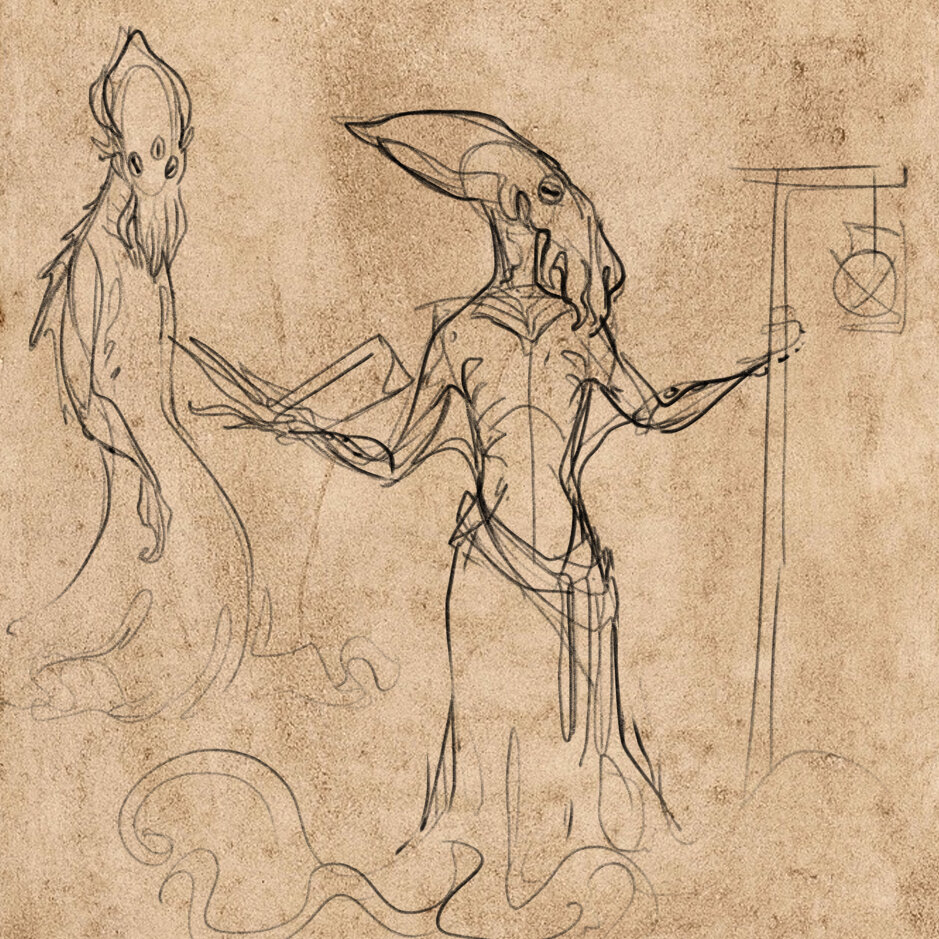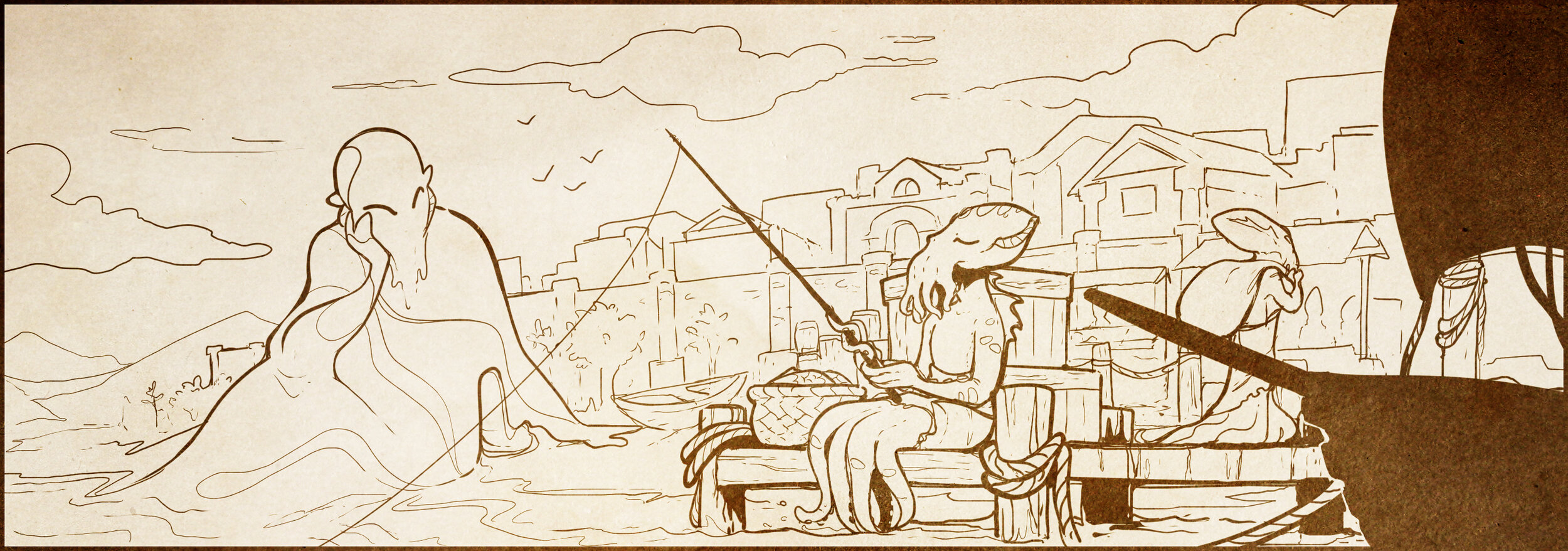
Ceph - A History
The First of a New Generation, nearly destroyed by the ego of a would-be god.
Art by Mia Pearce and Yoko Weaver
The Ceph are a species of humanoid squid-folk with an upright stance, three eyes, and clusters of tentacles at the base of their bodies that serve as their primary means of locomotion on land. According to what few records exist of the early days of the planet Teicna, the Ceph were the first intelligent species created by the gods after the Old World was destroyed for its flawed population. Their existence in the modern day is something of a miracle twice over. Not only were they not supposed to be created in the first place, but they survived a terrible attack on the whole of their species centuries later, only managing to come back from the brink of extinction due to the aid of their neighbors.
Although the gods had sworn off of creating more intelligent life in the wake of their initial failures, the Elemental God of water, Dalensh, snuck off to create the first Ceph in secret. He based their design on some of his favorite creatures of the sea, but specifically shaped them to be land-dwellers to see how they might adapt to such a drastically different environment.
Smitten immediately by them, Dalensh was unable to keep their creation a secret for very long, as they turned out to be quite successful in the habitat the god had attempted to corral them in. Before long, they had grown so populous and industrious that they spilled out into lands the other Elemental Gods were developing, exposing Dalensh’s secret project. The other gods were enraged at first, but held off from destroying his work long enough to see the value in the squid-like species. Their ability to shape the world around them was well beyond anything the Old World had managed in its brief lifespan, proving to be quite engaging for the gods to watch.
Spurred on by their successes, Dalensh managed to convince his siblings to create more intelligent life throughout the world, and so the Ceph were left to their own devices for a century or two. Their culture thrived, and their birthplace was steadily grown into a metropolitan center that rivals even some modern cities in scope and exceeded several in complexity.
The center of all Cephan development, the sprawling city of Demeris, was a frequent stop for the gods as they flitted across the globe establishing new species and civilizations. Dalensh in particular was said to spend a great deal of time watching the goings-on of its citizens, occasionally even being spotted by those with an eye for the spiritual realm. This reputation for wealth, size, and divine favor eventually led to efforts to develop Demeris into an arcology - a self-contained, self-sustaining city that could comfortably house the entire Cephan species.

External outposts and fledgling townships dwindled as Ceph across the homeland returned to Demeris to help in the effort to make it not only the greatest city the world had ever seen, but also the only one their people would ever need. The walls were raised up to accommodate a multi-tiered approach to housing. Complex plumbing systems were invented to keep the buildings and streets well-hydrated with clean water and a perpetual mist in the air. Mechanically-assisted grain processing mills were built that used the ocean’s tides as a power source, and fisheries were established that doubled as farms for both plants and fish that fed off of them. All in all, the dream of having a perfectly self-contained utopia seemed well within their reach.
Unfortunately, the end of this dream would come all too soon, and for reasons the Ceph could never have imagined, let alone stopped.
In the decades after the formation of Malephesh’s tear, a human mage had begun a strange and twisted process of becoming a demigod. They had become so powerful that they had managed to expunge their very identity from the world as a way of hiding from the gods, and still they sought more. Cities would vanish in the wake of horrifying magics, and as the gods scrambled to try and determine the culprit, the unnamable mage would remain hidden nearby, watching them in ways no other mortal could, learning their methods and attempting to siphon off even the smallest amount of their power. When this cycle had repeated enough times, their evil eyes rested upon the greatest possible test of their destructive potential: Demeris.
The gods, though still utterly unable to find or identify the culprit behind the devastation of so many mortal lives, had at least managed to comprehend the cycle of their actions and the kinds of targets that attracted their attention. Many suspected that Demeris might be too tempting a target for its own good, but the precise window wherein the mage might strike was too wide to pinpoint. The gods remained on high alert for months. Prayers went unanswered, shrines collected dust, the occurrence of miracles - even the minor, meddlesome sort - dropped dramatically. But no attacks came. Gods are powerful, but are neither omnipotent nor omniscient. Slowly but surely, they let their guard down as they tried to return to some semblance of normal operation while still keeping their eyes open for the next appearance of the mysterious townslayer.
When the end came for the Ceph, the gods were quick to respond, but not quick enough. A sickly green fog blew in from across the sea. Pulled into Demeris’ complex waterways, it was soon misted through almost the entire city. Those on the shoreline dropped dead almost immediately, while those inside succumbed more slowly as their own designs pumped poison into their homes and businesses. By the time the gods caught on to what was happening, much of the city was dead or dying. Some individuals were whisked away, while others were aided by divine protection as they worked to grab anyone they could and shepherd them free of their virulent home. Their presence on the scene allowed them to, at last, catch a fleeting glimpse of the perpetrator of this and past atrocities. Unfortunately, the mage had already increased their own strength with this heinous display, and managed to disappear once again with yet more of the gods’ power.
The gods retreated from the scene to come up with the plan to stop something like this from ever happening again. The Ceph, meanwhile, were left destitute and in mourning.
Even having survived the near-obliteration of the vast majority of their species, Demeris remained tainted in equal measure by both the ungodly poison flooding its waters and the bodies now rotting in its streets. They had nowhere to turn. Nowhere left to go that hadn’t been abandoned and allowed to fall into ruin ages ago. They might very well still have fallen into extinction at this point, were it not for the intervention of the Bufogren.
Frog-esque folks from the swamps to the north, the Bufogren and the Ceph had previously been on somewhat neutral terms, bordering on friendly. The former saw the latter as stuck-up and too obsessed with their ‘future glory’ to live in the moment, while the latter saw the former as hicks and yokels unwilling to strive for more. These thoughts were put aside for the moment, however, as the Bufogren saw only a people in great need of kindness and homes, both of which could be provided in abundance. The swamplands might not have had the power and grandeur of the ocean, but humidity was humidity in the end, and the two species only found more points of comparison between themselves as time went on.
In the centuries since that day, the two cultures have learned quite a lot from one another, but the distinct ‘Cephan Style’ remains to this day. Their ambition and vision drives them to build and develop and learn about the world around them whenever and however they can. Many of the world’s foremost scientists, engineers, and archivists can be found among the Ceph. And though they have an understandable aversion to developing large city centers, their designs have been used to establish many of the world’s largest, most efficient urban sprawls in the world.
Demeris, for its part, remains uninhabited. The instant mortality of the poison still flowing through it has waned in recent centuries, but the sheer amount of death and vast quantity of uncollected souls has developed into what scholars refer to as a Genius Loci. A Living City. The collective rage, fear, and despair of those that died within its walls have developed a sort of pseudo-consciousness that has gained control over the very stone the city is built from. Though it cannot move from its coastal location, it is said that its streets are constantly shifting and an alleyway taken on the way end may very well not even exist when one attempts to get back out. Few venture into that haunted place anymore, and fewer still of those who do ever leave again.

